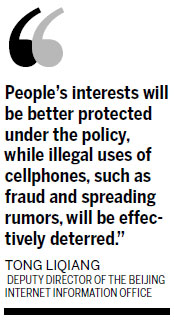Beijing to require ID for cellphone numbers
Updated: 2013-01-10 07:13
By Cao Yin (China Daily)
|
||||||||

Beijing residents will soon need to provide identification when they register a new cellphone number or transfer an old one, authorities said on Wednesday.
The so-called real-name system, part of a draft regulation still under discussion, follows similar moves by many micro-blogging websites to get users to log their personal details.
"People's interests will be better protected under the policy, while illegal uses of cellphones, such as fraud and spreading rumors, will be effectively deterred," said Tong Liqiang, deputy director of the Beijing Internet Information Office.
The capital should set a good example for the country, he said, adding: "The real-name system is a trend involved in the fast development of the Internet. It's a foundation for online management and will be helpful in promoting credibility in our country."
The Beijing Public Security Bureau, the city's communication administration and the commission of economy and information technology have also been involved in drawing up the policy.
Tong said the publication date of the regulation has not been set because many details need to be ironed out.
Reaction to the new rules was mixed among people contacted by China Daily on Wednesday.
Tang Yu, 24, a China Unicom customer, said she used her ID card when buying her cellphone in July 2011. "Showing my real identity to get a phone number is fine," she said. "It won't affect my life and can help block spam."
Wang Sheng, also 24, said he bought his cellphone SIM card in 2006 but would be happy to supply his real identity, as long as the procedure is convenient.
However, Zong Zheng was less willing. "I don't want to give my real name to a telecom company. It's unsafe," said the 27-year-old. "It could risk my privacy being leaked."
Beijing branches of the country's three telecom giants - China Mobile, China Unicom and China Telecom - welcomed the system, however, and said they are each introducing specific measures to follow the regulation.
China Mobile has more than 25 million users in Beijing, among whom 40 percent presented an ID when purchasing products, while China Telecom said more than 60 percent of its capital clients have registered with real names.
Xie Yi, a China Telecom employee, said the company has put together a team to handle the real-name work, and it asked all stores to ensure the identity of every new user was verified.
"We will remind current users to provide real identity certificates, and we will collect their information," he said. "Our employees and agents have an obligation and signed a contract to protect our users' information safety."
China Unicom said it will invest in a secure database to collect and protect users' information.
Since September 2010, the Ministry of Industry and Information Technology has imposed a real-name system on cellphone numbers, but it is not obligatory.
What companies should do as soon as possible is conduct an additional registration for their current clients and those who stored SIM card charges before their cellphone purchases, said Wang Zhenmin, a law professor of Tsinghua University.
"Previously, we saw many people selling cellphone numbers on the streets, and that will be curbed if the telecom operators can strictly enforce the real-name system," he said.
Ruan Qilin, a law professor at China University of Political Science and Law, echoed Wang's sentiments, saying the real-name system can contribute to residents' self-discipline and help police to trace those using cellphones to commit crimes.
He suggested the operators should be careful matching the users and their information.
caoyin@chinadaily.com.cn
(China Daily 01/10/2013 page5)

 In Photos: 7.0-magnitude quake hits Sichuan
In Photos: 7.0-magnitude quake hits Sichuan
 Li Na on Time cover, makes influential 100 list
Li Na on Time cover, makes influential 100 list
 FBI releases photos of 2 Boston bombings suspects
FBI releases photos of 2 Boston bombings suspects
 World's wackiest hairstyles
World's wackiest hairstyles
 Sandstorms strike Northwest China
Sandstorms strike Northwest China
 Never-seen photos of Madonna on display
Never-seen photos of Madonna on display
 H7N9 outbreak linked to waterfowl migration
H7N9 outbreak linked to waterfowl migration
 Dozens feared dead in Texas plant blast
Dozens feared dead in Texas plant blast
Most Viewed
Editor's Picks

|

|

|

|

|

|
Today's Top News
Live report: 7.0-magnitude quake hits Sichuan, heavy casualties feared
Boston suspect cornered on boat
Cross-talk artist helps to spread the word
'Green' awareness levels drop in Beijing
Palace Museum spruces up
First couple on Time's list of most influential
H7N9 flu transmission studied
Trading channels 'need to broaden'
US Weekly

|

|







